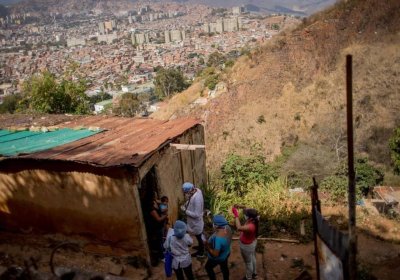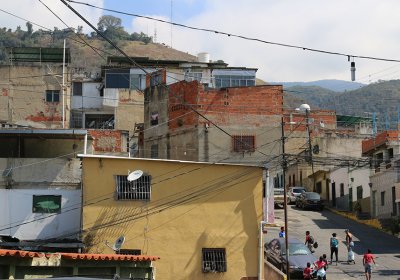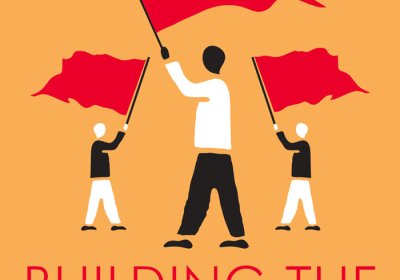Key to Venezuela's success to date in quashing the coronavirus have been the existing community organisations that permeate Venezuelan society. To get a sense of how the local communities are coping with the pandemic, Green Left’s Federico Fuentes spoke to Altos de Lidice Commune spokesperson Gsus Garcia.
communes
The women’s cooperative village of Jinwar was built by women on ecologically sustainable principles as a refuge for women fleeing war and patriarchy. However, since Turkey launched its invasion of Rojava on October 9, the sounds of war have become dangerously close and Jinwar is under serious threat.
Within hours of Venezuelan opposition leader Juan Guaidó calling for street mobilisations to back his attempted military coup against President Nicolás Maduro on April 30, Guaidó’s supporters had looted and set fire to the headquarters of the Indio Caricuao Commune in south-west Caracas, writes Federico Fuentes.
Representatives of 74 communes — institutions of popular power elected from grassroots communal councils — from across Venezuela gathered in Lara state late last month to participate in the inaugural National Assembly of Communes, writes Paul Dobson.
The meeting of more than 300 commune activists was held to try to strengthen the connections between different communes in a range of areas. This includes linking up productive micro-projects, communicational initiatives and educational networks.
Incumbent presidential candidate Nicolas Maduro prioritised visits to dissatisfied campesino communities over April 28-29 as part of a campaign strategy aimed at shoring up support in rural communities that have traditionally voted overwhelmingly for both ex-president Hugo Chavez and Maduro.
The countryside represents a critical constituency for the government in the upcoming May 20 election.
Venezuela’s socialists scored an overwhelming victory in mayoral elections on December 10, taking over 90% of the country's municipalities.
President Nicolas Maduro’s United Venezuelan Socialist Party (PSUV), along with its allies, have secured victory in 308 of Venezuela’s 335 municipalities. According to preliminary results, the governing socialist party managed to take 21 out of the country’s 23 state capitals as well as the Caracas Capital District.
In view of the December 10 municipal elections, communards and revolutionary activists closely associated with some of the most important initiatives in communal organisation in the country have been put forward as candidates for mayor.
Although we cannot say this is a mass phenomenon, it is undoubtedly a deeply significant event for various reasons.
Venezuela’s National Constituent Assembly (ANC) has denied permission to one of its grassroots delegates to stand as a mayoral candidate in the upcoming December 10 municipal elections.
Angel Prado was elected to the ANC on July 30 as a territorial delegate for his municipality of Simon Planas. Prado is also a leading member of the El Maizal commune in Lara state.
One of the most important aspects of Venezuela’s pro-poor Bolivarian Revolution has been its promotion of women's empowerment through community organisation.
To get a sense of how this grassroots process of community organising is developing and the role women are playing in the process, we visited the Ataroa and Lomas de Leon communes as part of the Venezuela Analysis international solidarity delegation in late August.
Thousands of Venezuelans took to the streets of Caracas on May 9 to rally in support of the country’s commune movement.
Socialist revolutionaries from across the country joined the march, calling on the government of President Nicolas Maduro to endorse a proposal to provide constitutional recognition of communes.
Building the Commune
By George Ciccariello-Maher
Verso Books, 2016
Every commune is different, George Ciccariello-Maher says in Building the Commune, but “the coffee is always too sweet, and the process is always difficult, endlessly messy and unpredictable in its inescapable creativity”.
Have you heard about Venezuela's communes? Have you heard that there are hundreds of thousands of people in nearly 1,500 communes struggling to take control of their territories, their labor, and their lives? If you haven't heard, you're not the only one. As the mainstream media howls about economic crisis and authoritarianism, there is little mention of the grassroots revolutionaries who have always been the backbone of the Bolivarian process.










